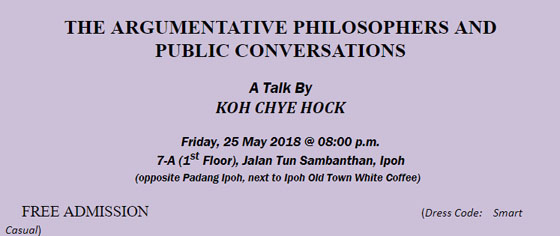Perak Academy Talk
Synopsis
In the best of philosophical tradition, the speaker is not an academic philosopher, and he is not in academia. He is, however, a philosopher in the sense that he is extremely curious and inquisitive about the vast diversity of human nature, the concern and search for a meaningful and purposeful life, and the varieties of thoughts and experiences and his own reflections on these matters.
By profession, he is a lawyer, but in his legal practice he brings with it a certain dose of philosophy. “I have often been asked how my studies in philosophy have helped me in the practical application of the law and the cut-and thrust world of corporate business. I do not cut or thrust; I practice law with a heavy dose of philosophical persuasion, compassion and detachment.”
In this sense, the speaker is a philosopher of the workplace, of the marketplace (the agora) and of the community; in this way, the speaker is engaged in public conversations. It was in the marketplace – the Agora of Athens – that Western philosophy was birthed, whose nurse-maid was Socrates.
One of the great hallmarks of philosophy is that it is less mindful and respectful of traditions as opposed to Law. Every philosopher seeks new grounds of ideas of the mind in the mental universe and called it a system, a philosophy, school of thought or “baptized” it with an ‘ism,’ which is a code for “territory” – a territory of the mind. Therefore, a philosopher is one who has a sense of adventure, exploration and discovery, a miner of thoughts and ideas. He goes out to “conquer ideas” and stake it an ‘ism’ and then he defends this new found “mental territory” by arguing about it, usually with his fellow philosophers.
In this lecture, in the speaker’s attempt to answer the questions: Why do philosophers argue? How do philosophers argue? What philosophers argue about? and “What is the purpose of philosophy? The speaker hopes to paint the broad outlines and evoke flashes of what philosophy is, who is a philosopher and what kind of a “creature” we call “philosopher” through examining certain key divisional aspects of philosophy and philosophers in the history of Western philosophy.
In the history of philosophy, many binary distinctions have been applied: nominalist/realist; empiricist/rationalist/transcendentalist; materialist/idealist. There are, of course, giants in philosophy such as Kant who straddled the divisions, but these divisions have not been removed. One of the dualisms which runs deeply through philosophy’s history is that between a view of philosophy which sees its task is to understand the use of concepts and the meaning of words, and a view of philosophy which sees its task is to understand the world and the good life.
The speaker contends that it is the business of philosophers to argue, debate and to tease or force out the fundamental truths that Nature continues to guard jealously and to engage in public conversations. Philosophers like to poke their noses not just at people but also at Nature.


